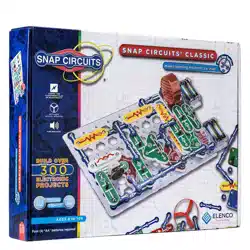Loading ...
Loading ...
Loading ...

14
Project #9
Rebuild the circuit from Project #2, but reverse the polarity on the motor
(M1) so the negative (–) on the motor goes to the positive (+) on the battery
(B1). New alkaline batteries are recommended for this project.
When you close the slide switch (S1), the motor will slowly increase in
speed. When the motor has reached maximum rotation, turn the slide
switch off. The fan blade should rise and oat through the air like a ying
saucer. Be careful not to look directly down on fan blade when it is spinning.
The air is being blown down through the blade and the motor rotation locks
the fan on the shaft. When the motor is turned off, the blade unlocks from
the shaft and is free to act as a propeller and y through the air. If speed of
rotation is too slow, the fan will remain on motor shaft because it does not
have enough lift to propel it. The motor will spin faster when both batteries
are new.
If the fan doesn’t y off, then turn the switch on and off several times rapidly
when it is at full speed.
Flying Saucer
OBJECTIVE: To make a circuit that launches the fan blade to
simulate a ying saucer.
Project #10
OBJECTIVE: To show how voltage affects speed of a DC motor
and can decrease the lift of the saucer.
Change the circuit in Project #9 by adding the lamp (L1) in series with the
motor as shown in the diagram on the left.
When you place the lamp in series with any electronic device, it will draw
less current because it adds resistance. In this case, the lamp in series
reduces the current through the motor, and that reduces the top speed
of the motor. Close the slide switch (S1), and wait until the fan reaches
maximum speed. Open the switch and observe the difference in the
height due to the lamp. In most cases, it may not even launch.
Decreasing Saucer Lift
!
WARNING: Moving parts. Do not touch the fan or
motor during operation. Do not lean over the motor.
!
WARNING: Moving parts. Do not touch the fan or
motor during operation. Do not lean over the motor.
!
WARNING: Fan may not
rise until switch is released.
!
WARNING: Fan may not
rise until switch is released.
+
Loading ...
Loading ...
Loading ...
